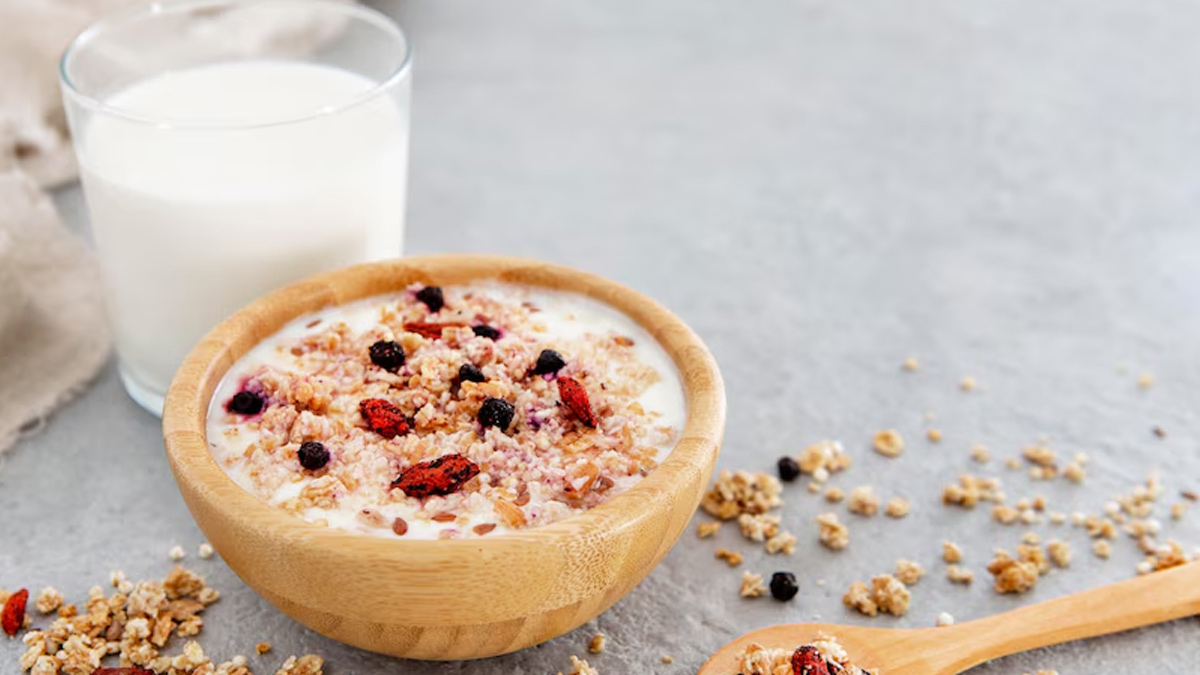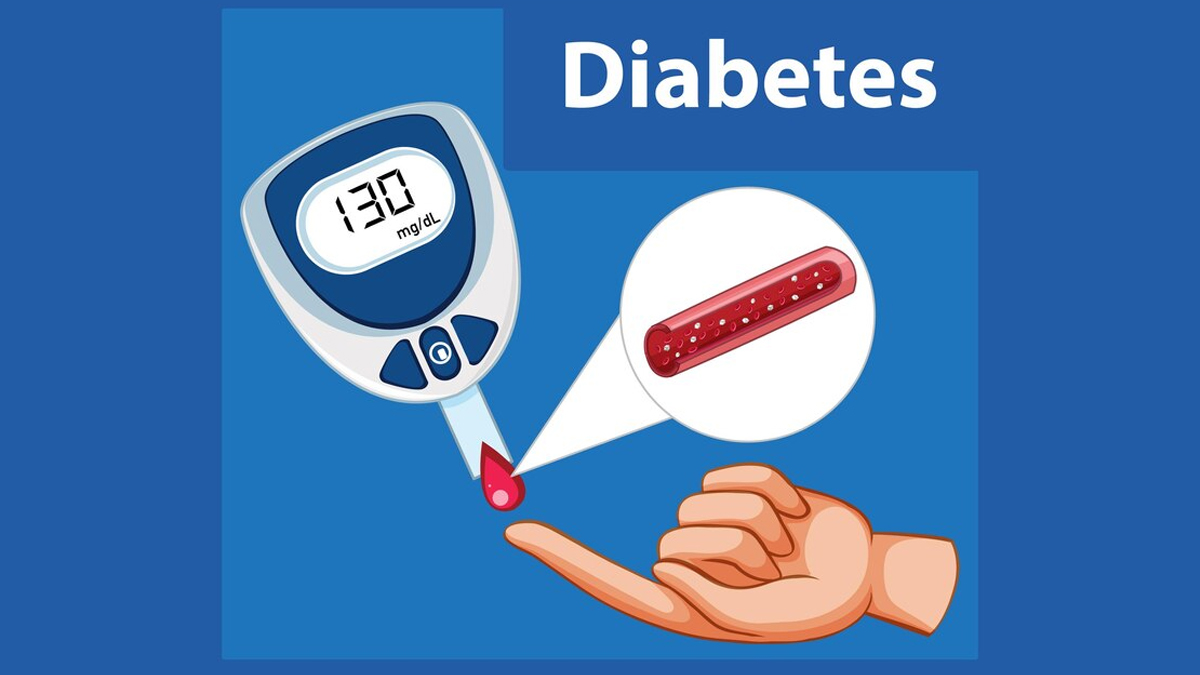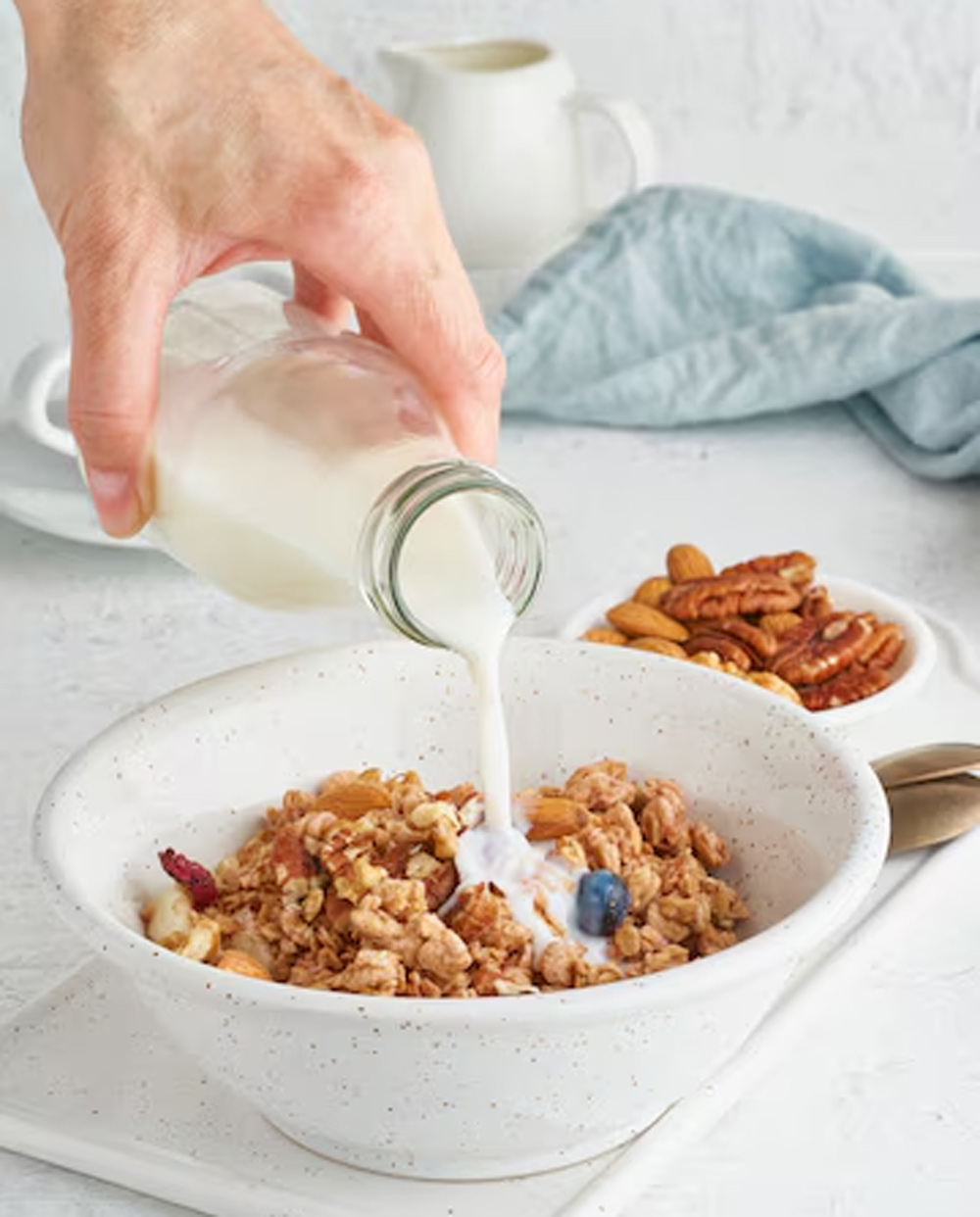
Managing diabetes requires careful attention to diet, particularly when it comes to choosing foods that help regulate blood sugar levels. One breakfast option that has gained attention for its potential benefits is muesli, often paired with milk. This nutritious combination offers a balance of fibre, protein, and healthy fats, making it a good choice for those looking to maintain stable glucose levels. With the right selection of ingredients and mindful consumption, muesli with milk can play an important role in managing diabetes, offering more than just a satisfying start to the day.
Table of Content:-
To understand how muesli and milk can help manage diabetes, OnlyMyHealth team interacted with Dr Apurrva Sawant, Preventive Healthcare Expert, Mumbai.
What Makes Muesli Special?

Muesli is a wholesome blend of rolled oats, nuts, seeds, and dried fruits, providing an array of nutrients. "Muesli is a breakfast choice that combines rolled oats, nuts, seeds, and dried fruits. It offers nutrients like fibre, protein, and essential vitamins, making it a well-balanced meal. For those managing diabetes, understanding the effects of muesli with milk is crucial," explains Dr Sawant.
The high fibre content, particularly beta-glucan found in oats, is a key factor. Beta-glucan is a soluble fibre that slows down the digestion of carbohydrates, leading to a gradual release of glucose into the bloodstream. This helps prevent sudden blood sugar spikes and supports stable levels throughout the day.
Also read: Air Pollution Linked To Increased Risk Of Type 2 Diabetes: 5 Ways To Stay Protected
Blood Sugar Regulation and Insulin Stability

Muesli’s ingredients typically have a low glycaemic index (GI), which is beneficial for blood sugar control. "Muesli is known for its fibre-rich oats, which contain beta-glucan. This soluble fibre slows carbohydrate digestion, preventing rapid increases in blood sugar. The gradual release of glucose helps in maintaining stable levels," shares Dr Sawant.
Dr Sawant further adds, "The inclusion of oats and fibre helps stabilise insulin responses. For diabetics, this consistency in sugar levels can be an effective tool for disease management. A diet with such benefits reduces risks of complications."
The protein and healthy fats from nuts and seeds in muesli also play a crucial role. These nutrients provide a steady energy source and contribute to managing post-meal sugar levels.
Weight Management Benefits
Maintaining a healthy weight is critical for individuals with type 2 diabetes. Muesli’s high fibre content promotes satiety, reducing hunger and calorie intake throughout the day. Dr Sawant highlights, "Weight management is a cornerstone in controlling type 2 diabetes. Muesli's fibre promotes a sense of fullness, helping regulate appetite. This satiety can lead to fewer calorie intakes during the day."
By supporting weight management, muesli indirectly contributes to better diabetes control. Excess weight is a risk factor for worsening diabetes, making dietary choices like muesli beneficial for long-term health goals.

Also read: Can Weight Gain Affect Your Blood Sugar Levels? Doctor Explains
Enhancing Insulin Sensitivity
Foods like muesli with slow-releasing starches can improve insulin sensitivity, which is essential for glucose metabolism. Nutrients such as magnesium and zinc, commonly found in muesli ingredients, further enhance insulin function. "Magnesium and zinc in muesli contribute to improved insulin function and help manage diabetes-related complications," says Dr Sawant.
The Role of Milk in Muesli

Milk is a natural partner to muesli, adding essential nutrients like calcium and protein, which make the meal more balanced. "Milk’s glycaemic index is lower than many carbohydrate sources, which is beneficial for blood sugar," notes Dr Sawant.
However, it is important to consider milk's lactose content, which can impact sugar levels. Opting for low-fat or plant-based milk alternatives, such as almond or soy milk, can help mitigate this while retaining nutritional benefits.
Smart Choices for Maximum Benefits
Not all muesli products are diabetes-friendly. Many commercially available options contain added sugars, which can counteract the benefits. Dr Sawant advises, "Unsweetened or low-sugar muesli is a better choice for blood sugar control. Selecting the right ingredients in muesli is critical for ensuring these benefits."
Portion control is equally important. Large servings may lead to excessive carbohydrate intake, so moderation is key. Pairing muesli with milk alternatives can further reduce sugar content while maintaining a nutrient-rich profile.
Conclusion
Muesli and milk can indeed be a valuable addition to a diabetic diet when consumed thoughtfully. Their combined fibre, protein, and nutrient content support blood sugar regulation, weight management, and overall health. As Dr Sawant summarises, "Muesli and milk can be a beneficial addition to a diabetic diet. Their fibre, protein, and nutrient content aid in blood sugar regulation and weight management. Proper selection of ingredients and mindful portion control are key to maximising health benefits."
Incorporating muesli with milk into your daily routine can be a step toward better diabetes management, provided you choose wisely and remain consistent in your approach.
Also watch this video
How we keep this article up to date:
We work with experts and keep a close eye on the latest in health and wellness. Whenever there is a new research or helpful information, we update our articles with accurate and useful advice.
Current Version